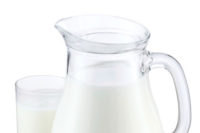Dairy Linked to Fertility?
Researchers have found that women who drink whole milk and eat full-fat dairy products are more fertile than those who stick to low-fat products. The findings could help explain the growth of infertility in the West as fashion-conscious young women trying to eat healthily and stay slim have shunned full-fat dairy products such as whole milk.
Eating two or more servings of low-fat dairy products a day -- which could include a portion of cottage cheese and a low-fat yoghurt -- increased the risk of infertility due to lack of ovulation by 85%, the researchers found. However, women who ate at least one serving of high-fat dairy food a day cut their risk of infertility from this cause by 27%.
The more ice cream the women ate the lower was their risk of infertility. Women eating ice cream two or more times a week had a 38% lower risk of infertility than those who consumed ice cream less than once a week. In the U.S., ice cream is made with full-fat dairy milk. Low-fat versions, sold in Britain as ice-cream, are called sherbet in the United States.
The study involved more than 18,000 women aged 24 to 42 who had no history of infertility and had tried to become pregnant between 1991 and 1999. They were part of a larger study of 116,000 women called the Nurses Health Study II in the United States.
Jorge Chavarro, of the Harvard School of Public Health who led the study published in Human Reproduction, said women wanting to conceive should examine their diet."Women should consider changing low-fat dairy foods for high-fat dairy foods, for instance by swapping skimmed milk for whole milk and eating ice-cream, not low-fat yoghurt," he said.
Even substituting one glass of whole milk for skimmed milk a day made a significant difference. The changes should be made without increasing the total amount of saturated fat or calories in the diet by making small adjustments elsewhere. Once pregnancy was achieved it was wise to switch back to a low-fat diet because it was easier to limit the intake of saturated fat and calories.
The advice runs counter to official US dietary guidelines, which recommend adults should eat at least three servings a day of low-fat dairy products. Similar advice is issued in the United Kingdom.
Dietary fat has an impact on hormone levels and this was the most likely explanation for the effect, Dr Chavarro said. Whey proteins added to low-fat milk have been found to have androgenic (male hormone-like) effects in animals which could suppress ovulation. Whole milk and other high-fat dairy products have higher concentrations of oestrogen (the female hormone) which promote ovulation. Dr Chavarro said: "It is possible that the trend to eating more low-fat dairy products in recent decades could have increased infertility rates but more research is needed."
Chris Barratt, professor of reproductive medicine at the University of Birmingham, said, "It's a very comprehensive study, and because of the large number of patients you can have some confidence in the results. Diet clearly has a big effect on fertility in both men and women."
From the March 13, 2007, Prepared Foods e-Flash
Looking for a reprint of this article?
From high-res PDFs to custom plaques, order your copy today!




